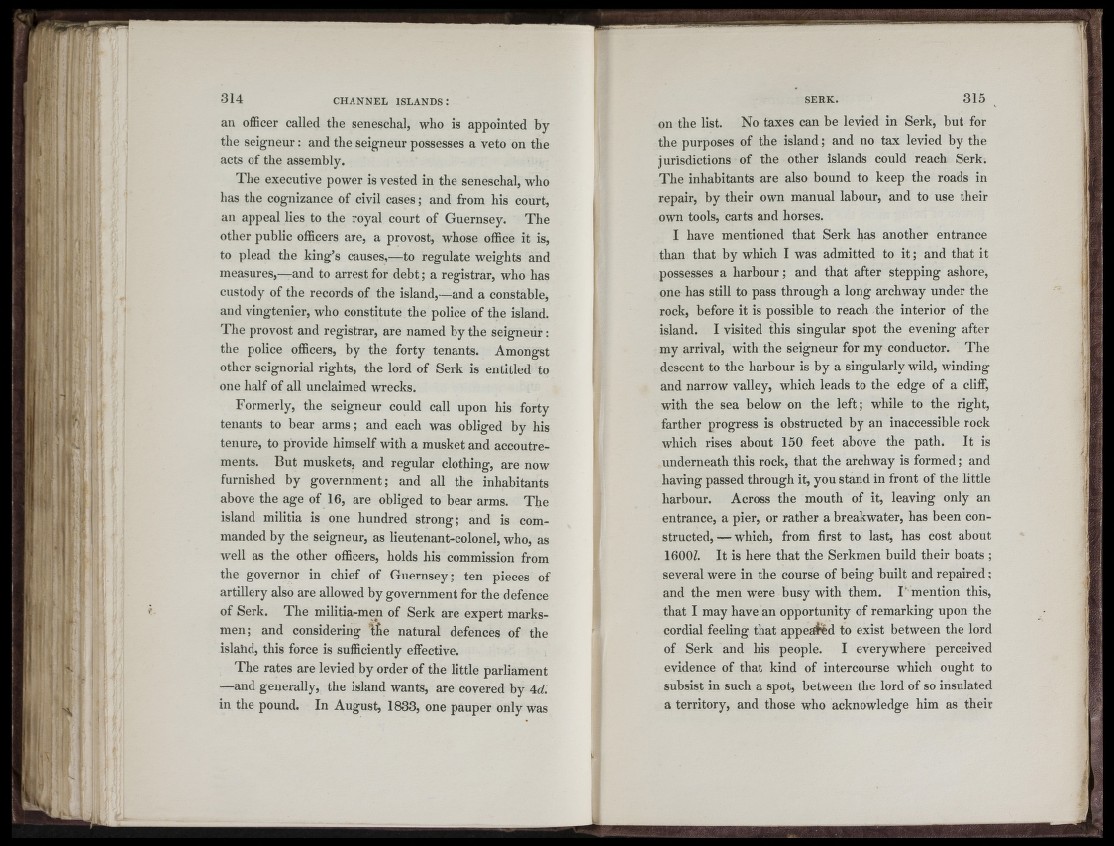
Z ii li
|ri--\ ■T^ r i/ : ¥ J
IL
I ' r» .■H •
A l
*
A
an officer called the seneschal, who is appointed by
the seigneur : and the seigneur possesses a veto on the
acts of the assembly.
The executive power is vested in the seneschal, who
has the cognizance of civil cases ; and from his court,
an appeal lies to the royal court of Guernsey. The
other public officers are, a provost, whose office it is,
to plead the king’s causes,—to regulate weights and
measures,—and to arrest for debt ; a registrar, who has
custody of the records of the island,—and a constable,
and vingtenier, who constitute the police of the island.
The provost and registrar, are named by the seigneur :
the police officers, by the forty tenants. Amongst
other seignorial rights, the lord of Serk is entitled to
one half of all unclaimed wrecks.
Formerly, the seigneur could call upon his forty
tenants to bear arms ; and each was obliged by his
tenure, to provide himself with a musket and accoutrements.
But muskets, and regular clothing, are now
furnished by government; and all the inhabitants
above the age of 16, are obliged to bear arms. The
island militia is one hundred strong; and is commanded
by the seigneur, as lieutenant-colonel, who, as
well as the other officers, holds his commission from
the governor in chief of Guernsey; ten pieees of
artillery also are allowed by government for the defence
of Serk. The militia-men of Serk are expert marksmen;
and considering lÎie natural defences of the
islahd, this force is sufficiently effective.
The rates are levied by order of the little parliament
—and generally, the island wants, are covered by 4d.
in the pound. In August, 1833, one pauper only was
on the list. No taxes can be levied in Serk, but for
the purposes of the island; and no tax levied by the
jurisdictions of the other islands could reach Serk.
The inhabitants are also bound to keep the roads in
repair, by their own manual labour, and to use their
own tools, carts and horses.
I have mentioned that Serk has another entrance
than that by which I was admitted to i t ; and that it
possesses a harbour; and that after stepping ashore,
one has still to pass through a long archway under the
rock, before it is possible to reach the interior of the
island. I visited this singular spot the evening after
my arrival, with the seigneur for my conductor. The
descent to the harbour is by a singularly wild, winding
and narrow valley, which leads to the edge of a cliff,
with the sea below on the left; while to the right,
farther progress is obstructed by an inaccessible rock
which rises about 150 feet above the path. It is
underneath this rock, that the archway is formed; and
having passed through it, you stand in front of the little
harbour. Across the mouth of it, leaving only an
entrance, a pier, or rather a breakwater, has been constructed,
— which, from first to last, has cost about
1600/. It is here that the Serkmen build their boats ;
several were in the course of being built and repaired;
and the men were busy with them. 1“ mention this,
that I may have an opportunity of remarking upon the
cordial feeling that appealed to exist between the lord
of Serk and his people. I everywhere perceived
evidence of that kind of intercourse which ought to
subsist in such a spot, between the lord of so insulated
a territory, and those who acknowledge him as their